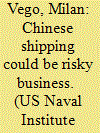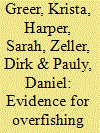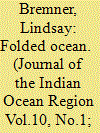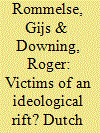|
|
|
Sort Order |
|
|
|
Items / Page
|
|
|
|
|
|
|
| Srl | Item |
| 1 |
ID:
130062


|
|
|
|
|
| Publication |
2014.
|
| Summary/Abstract |
Although their economy is increasingly dependent on maritime trade, China lacks the ability to protect its shipping-a dangerous reality should they find themselves in a major war at sea.
China's greatest strength is at the same time its greatest weakness. With the second largest global economy, about 60?70 percent of China's economic activity today is directly or indirectly linked to trade with other nations. 1 In 2011 85 percent of China's total trade was by sea. 2 In this regard, the country is increasingly dependent on maritime trade-and the security of its sea lanes-for its economic vitality, high standard of living, and military strength.
|
|
|
|
|
|
|
|
|
|
|
|
|
|
|
|
| 2 |
ID:
130875


|
|
|
|
|
| Publication |
2014.
|
| Summary/Abstract |
The fisheries statistics systems of many countries are performing poorly, often failing to report on small-scale catches, particularly from subsistence and recreational fisheries. These deficiencies, which lead to the underestimation of catches, are particularly evident in overseas territories of developed countries. This study is an attempt to remedy this for the years 1950-2010 for the Australia Indian Ocean Territories, an area from which little reporting is done. The results suggest that the Cocos (Keeling) Islands had a catch of approximately 80 t·year?1 in the 1950s (essentially subsistence based), which increased, starting in the mid-1980s to reach 250 t·year?1 in recent years, mainly due to the introduction of recreational and later commercial fishing, with signs of overexploitation since 2000. The coastal catch from Christmas Island was tentatively assessed as being higher (40-70 t·year?1) in the 1950s and 1960s than in the 2000s (<30 t·year?1). Fisheries managers in these areas should focus on determining primary target species and their vulnerability to overfishing, as well as developing island specific recreational fishing management plans.
|
|
|
|
|
|
|
|
|
|
|
|
|
|
|
|
| 3 |
ID:
130873


|
|
|
|
|
| Publication |
2014.
|
| Summary/Abstract |
This paper presents experimental research on the Indian Ocean being undertaken within the context of what has been termed architecture's contemporary geographic turn. It investigates how oceanic practices and protocols fold into spatial and architectural products on land, figuring both sea- and land-based logics. It frames this ocean through three tropes: as contact zone, with which are associated ideas of creolisation, transnationalism, entanglement, compaction and multi-polarity; as circulator with which are associated ideas of connectivity, passage, lane, route, choke point, network, port, dock and deposit; and as ecology, with which are associated ideas of liquidity, cycle, rhythm and climate change. The paper introduces these tropes and investigates sites brought into focus through them, highlighting the wider global dynamics or processes they reveal. It concludes with provisional thoughts about what these amphibious sites offer for understandings of architecture and urbanism in today's hyper-articulated, globalised world.
|
|
|
|
|
|
|
|
|
|
|
|
|
|
|
|
| 4 |
ID:
130775


|
|
|
|
|
| Publication |
2014.
|
| Summary/Abstract |
The year 2013 will go down in maritime annals as one of extraordinary contradictions, with optimism finally dislodging the melancholic recent past. This is not to imply that the maritime sector is on tranquil waters or that we are on another upswing toward record profitability similar to a decade ago. On the contrary, the recovery is still very tenuous; in fact, the highly visible container shipping market worsened last year. However, the aura of a change in the overall market trend and confidence became very noticeable toward the last quarter of 2013. And, after a gap of several decades, there are even harbingers of a domestic maritime renaissance, driven by unprecedented developments in the energy secto
|
|
|
|
|
|
|
|
|
|
|
|
|
|
|
|
| 5 |
ID:
146803


|
|
|
|
|
| Contents |
Dutch prisoners from the sea battles of the First Anglo-Dutch War of 1652–1654 were held in England under generally inhumane conditions. It has recently become accepted that ideological differences, as much as commercial, led to the deterioration in relations that led to the conflict. English public opinion had been inflamed by a vicious anti-Dutch propaganda campaign, suggesting that ideological demonization could provide the explanation for the dire treatment to which the prisoners were subjected. It is concluded, however, that logistical problems associated with their reception, plus the chronic lack of money of Cromwell’s regime, provide a sufficient explanation.
|
|
|
|
|
|
|
|
|
|
|
|
|
|
|
|
|
|
|
|
|